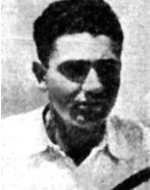Idelowicz, Yitzhak
Born in 1925 in Vienna, the capital of Austria. When he was six months old, he was raised by his father and educated by his mother and two sisters in a national spirit, the heritage of the patriarchs. He learned from Zionist teachers in the Jewish community school and from his childhood he continued to the Gordonia movement. With the outbreak of World War II, he arrived in Israel on a final legal immigration before the roadblock was blocked. Because of his early age, he was not immediately accepted to Youth Aliya, and spent a year at a relatives’ home in Ra’anana. When he was 15 years old, he was accepted to a youth group from Germany and Austria in Kfar Maccabee. Where he continued to work in the field of agriculture, and wandered in the fields after school, and at his urging they allowed him to practice driving a tractor. After further training in Kfar Hahoresh he immigrated with the Hadassah-Gezer group to settle near the Ramle-Jerusalem road and continued to work in the field. In his youth he was interested in everything and talked a lot. When a youth closed himself, he fulfilled his duty to work in the agriculture and to train the Haganah and lived as if he were outside the company. In his letters to his relatives scattered around the postcards of Shanghai, the Netherlands, and Yawa, he expressed his feelings about the situation in Palestine during the period of British oppression and the beginning of the War of Independence: “I, the pacifist, have not yet adapted my mind to our new situation. To greet the enemy who is attacking with empty hands, an eye for an eye, a tooth for a tooth! ” In another letter: “Behind us Auschwitz and Majdanek, the gas chambers and the mass graves, we have no other way but to fight for our right to live!” This right was fought against the armored Arab Legion when they broke into the group’s courtyard. Carrot was located next to the Ramle-Latrun road, and the Legion forces in the area saw it as a threat and asked it to be taken in preparation for the approaching truce. On Tuesday, June 10, 1948, an enemy force, consisting of a Legion Company, organized irregular forces and armored vehicles, attacked the kibbutz, and the enemy’s heavy fire destroyed the defensive positions and paralyzed any possibility of organized resistance. In which Yitzhak fell and was brought to rest in the cemetery in Gezer.
